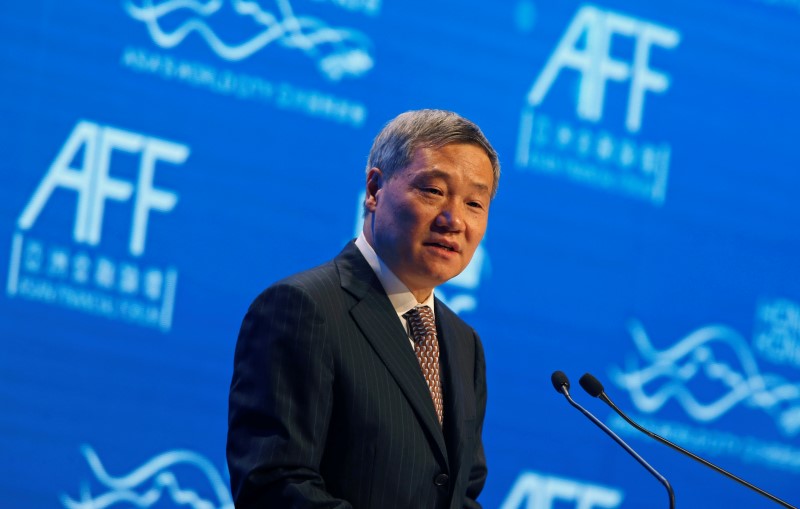By Matthew Miller and Shu Zhang
BEIJING (Reuters) - Xiao Gang, China's stock market tsar, once remarked that the only thing he'd done right in life was marry his wife.
No doubt the self-effacing Xiao, chairman of China Securities Regulatory Commission (CSRC), has done many other things right. Managing the stock market, though, might not be a high point of his career.
Xiao faced internal criticism from the ruling Communist Party for his handling of the stock market crash last year, sources with ties to the leadership said at the time.
In another blow, a "circuit breaker" mechanism to limit stock market losses that was introduced on Monday was deactivated by Thursday after it was blamed for exacerbating a sharp selloff. Online media had nicknamed Xiao "Mr Circuit Breaker".
"There has to be responsibility. People are looking to the leader at the regulator. Xiao Gang is the public face," said Fraser Howie, an independent China market analyst and co-author of the book "Red Capitalism".
"He was lucky to keep his job after the fiasco of July and August."
The CSRC did not respond to a request for comment.
Xiao, 57, became chairman of the CSRC in the leadership churn when President Xi Jinping came into power, taking the helm of the regulator in March 2013. At the time, Chinese markets had been among the world's worst-performing for six years - indeed they had not recovered from their collapse during the global financial crisis.
Unfortunately for Xiao, they still haven't.
The challenge Xiao faced upon taking up the post was enormous: to attract fresh investment into equities from speculative bubbles in sectors like real estate, while defending against endemic insider trading.
To pull any of this off he needed to first convince China's legions of small retail investors, who dominate transactions but are infamously fond of quick-hit speculative plays, that stocks are a safe place to park long-term capital.
The urgency was heightened by the need to deal with China's corporate debt overhang - Chinese firms had become almost entirely dependent on bank loans for financing, which naturally prejudiced economic development towards collateral-rich heavy industry and away from the innovative, nimble technology companies that tend to rely more on stock issuances to fund quick growth.
Market sources have said it would be unfair to put the blame for China's stock market crash on just Xiao or the CSRC. Other state agencies made missteps and the Beijing leadership backed measures imposed by the CSRC that was part of a coordinated effort.
YEARS OF EXPERIENCE
The ruling Communist Party's Organization Department, which oversees personnel appointments, described Xiao as: "Young, energetic, resolute, simple in style, familiar with macroeconomics and financial services, conscious about innovation in reforms, good at researching problems, with strong organisation and coordination abilities."
Before leading the CSRC, Xiao was chairman of Bank of China Ltd (BoC) <601988.SS> (HK:3988), China's fourth-biggest lender, for a decade until 2013.
During his tenure, BoC for the first time introduced foreign shareholders, including Royal Bank of Scotland Group PLC (L:RBS) and UBS AG, and finished a $13.7 billion dual-listing in Shanghai and Hong Kong in 2006, the first of China's "Big Four" state-owned commercial banks to sell shares to the public.
Xiao, who holds a BA in finance and an MA in law, was also one of the first top banking executives to voice the risks of shadow banking, a system through which banks used wealth management products to conduct off-balance-sheet lending. Xiao warned that shadow banking was causing a growing liquidity risk in financial markets and was endangering the banking system.
Before heading BoC, Xiao worked at the People's Bank of China for 22 years, starting in 1981. He was named deputy governor of the central bank in 1998, where he was responsible for regulating the emerging trust industry. He is also a member of the central bank's monetary policy committee.
In an interview with Hong Kong's Phoenix Television in 2012, Xiao, then chairman of BOC, said "the only thing I have done right in my life is to marry my wife".
He said he had been bad at maths, and finance wasn't his first choice of college major. He had dreamed of studying Chinese in college, but his score was not good enough.
But he amassed years of experience and became a leader in the finance industry. Still, the past year has been a massive challenge.
China stock market started a dramatic roller-coaster ride, with the CSI300 index (CSI300) more than doubling between November 2014 and June 2015, before plummeting about 40 percent since then, mostly during a spectacular crash over the summer.
In the first four days of trading in 2016, the CSI has dropped 12 percent.
Some investors blamed Xiao and the CSRC for taking aggressive measures to crack down on margin trading as the cause of the rout since last year.
Authorities have been trying to restore confidence in the stock market by cracking down on alleged market manipulation. A number of officials, securities executives, fund managers, journalists and social media commentators have been put under investigation.
The ill-fated circuit breaker didn't help. China's stocks are still down 70 percent from the peak in 2007.
(Reporting Shu Zhang and Matthew Miller; Editing by John Ruwitch and Neil Fullick)
